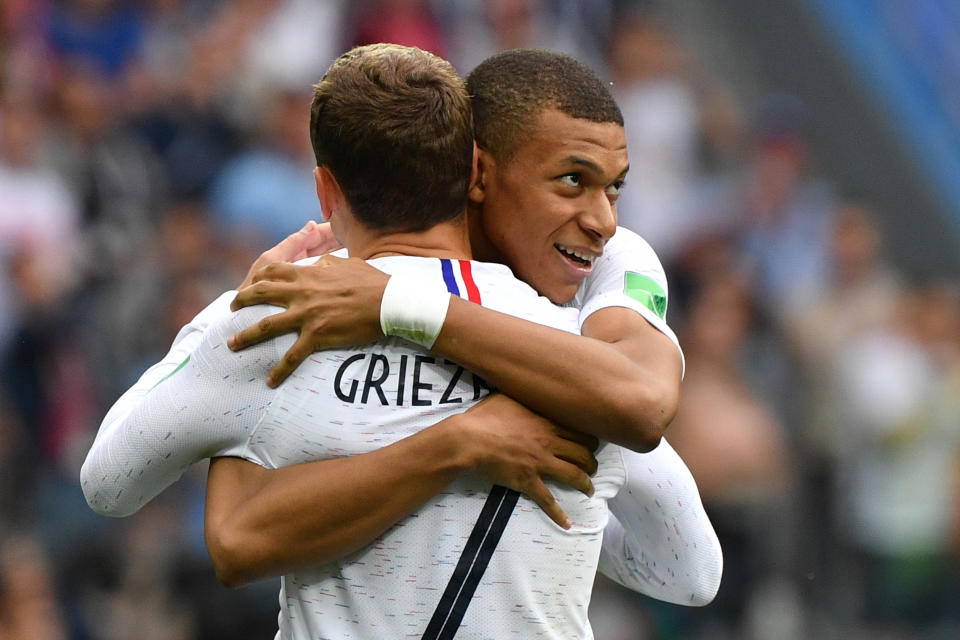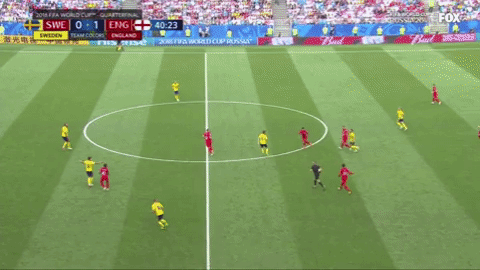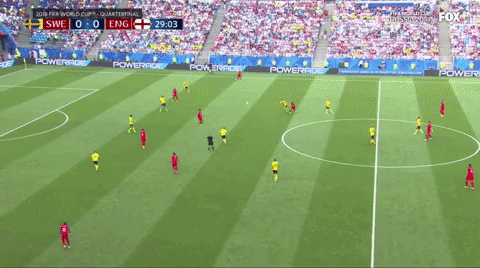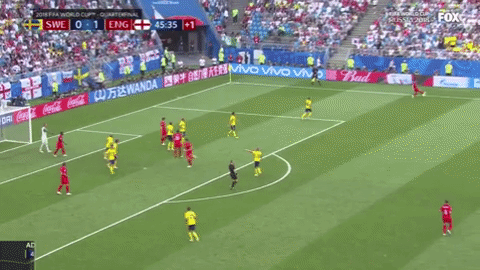4 players, tactics and trends that will decide the 2018 World Cup semifinals
After another brief hiatus, the World Cup is back. It’s into its final week, on the home stretch. One might even say it’s coming home. The semifinals are here. And we’re here to preview them.
France and Belgium will do battle in the first semifinal on Tuesday (2 p.m., Fox, Telemundo). England and Croatia will contest the second semi on Wednesday (2 p.m., Fox, Telemundo). Here are four nuggets to watch for:
1. The case for France’s unimaginitiveness
France is simultaneously the most entertaining and most infuriating team at the World Cup. On one hand, it has players who can do this:
Mbappé’s speed is a problem for Argentina.
: @FOXSoccer pic.twitter.com/X5rPtsfTMC
— Yahoo Sports (@YahooSports) June 30, 2018
On the other, France has fashioned less than 1.0 Expected Goals per game in Russia. Brazil, by comparison, created more total xG in its last two games alone, and more than twice as many over all five matches.
The France narrative, for as long as 2018 World Cup narratives have existed, has been that Didier Deschamps, perhaps building Les Bleus in his midfield destroyer image, has shackled a squad overflowing with talent. He’s clamped down on fun. He’s made the World Cup’s most lovable group of players boring. Frustration, therefore, is understandable.
But Deschamps is getting results, just as he did at Euro 2016. By playing an extra defensive-minded midfielder (Blaise Matuidi) and an inexpressive style, he’s essentially reducing a game often defined by patterns and rhythm to a series of isolated moments. He’s putting the outcome in the hands of individuals – their magic and their mistakes – rather than the collective. He’s betting his 11 players will make more magic and fewer mistakes than yours.

And you know what? That’s a pretty darn good bet, given the talent at his disposal. It makes France a favorite in every game it plays. Now, does it sometimes make France less of a favorite than it could or should be? Does it reduce the margin for error? Yeah, probably. But it also ensures France won’t get caught out and carved up like Germany and Spain were – or, perhaps more pertinently, like Brazil was in the first half of its quarterfinal against Belgium.
France won’t let Romelu Lukaku, Eden Hazard and Kevin De Bruyne run free. Which leads us to our second point …
2. What does Roberto Martinez have up his sleeve?
Roberto Martinez’s answer to the quarterfinals’ most vexing question was more brilliant than any of us could have imagined. He dipped into an old bag of tricks, picked out one titled “Everton 3-0 Arsenal, April 6, 2014,” and repurposed it to expose Brazil. On that day four years ago, he’d deployed Lukaku as a right winger and ripped the Gunners to shreds. Lukaku cut inside from the right wing, powered in Everton’s second goal, and made a beeline for Martinez on the touchline to celebrate.
Four years later, Lukaku turned facilitator for the goal that ultimately knocked off the World Cup favorites. After the upset, he said, “I played in the system before at Everton, so I knew exactly what to do. I helped Hazard and De Bruyne during the game by explaining what positions they had to take and what they had to do on the pitch.”
This, however, was a very specific gameplan for a specific situation. It exploited the attacking tendencies of Brazil’s fullbacks and the absence of the Selecao‘s defensive midfield shield. France, on the contrary, has the world’s best defensive midfield shield in N’Golo Kante, and has fullbacks – natural center backs, actually – who stay at home:

So it’s unlikely Martinez will roll out the same plan again. Lukaku hasn’t suddenly turned into a winger. Belgium hasn’t suddenly mastered a back three/four hybrid. Its base system – the one from which Martinez had to deviate to upend Brazil – hasn’t changed.
But if Belgium goes back to it, the vulnerabilities exposed by Japan in the Round of 16 still linger. If Dries Mertens returns to the starting 11 in place of Marouane Fellaini, and if De Bruyne drops back into midfield, Kylian Mbappe and Antoine Griezmann could have field days. So what will Belgium do?
Circumstance might call for another Bobby Martinez special that none of us see coming.
3. Raheem Sterling’s importance to England
England is in the World Cup semifinals, and yet for some reason, fans and pundits still want to pick apart the faults of Raheem Sterling. He’s become the Three Lions’ most polarizing player. On one hand, you have tabloids and the curmudgeonly old Britons who read them. They, often fueled by implicit racism, brand Sterling as England’s weak link.
On the other hand, you have people who actually understand soccer.
Sterling is so, so, SO vital to England. “He has been a really important part of the team,” manager Gareth Southgate recently said. “In the last five or six games, with the change of system [to a 3-5-2], he has been key. His movement, his ability to run at teams from deep, his interchanging of position with the other forward players is very important. At times, I have wondered why there has been such a focus on his position in the team and not others.”
Don’t believe Southgate? Just have a look at the first half of the Sweden game, and you’ll be convinced.
As Southgate mentioned, Sterling’s variety is crucial. There’s not a type of run that isn’t in his arsenal. He tugs at a defense every which way. He’s a striker, a winger and a roaming attacking midfielder all at once. He pops up between the lines and spurs England forward:

He stretches a back line vertically, making aimless long balls dangerous, and creating chances out of nothing:

He peels wide and drives at fullbacks:

He runs out to in, dragging an opposing fullback with him and opening up space for a wingback’s cross:

His movement is so clever. Far too often, on plays like the following one, fans and pundits focus on his lack of end product rather than the run that put him in a favorable position in the first place.

Sterling could leave the World Cup scoreless and still have played a massive role in England’s success. Even if he can’t finish or pick a final pass, he’ll at least win free kicks and corners. Both are incredibly valuable for a team that’s been dominant on set pieces. The penultimate clip above led to England’s opening goal against the Swedes. It wouldn’t have happened without Sterling.
The Manchester City forward will be a hellish matchup for a Croatia side that plays without a dedicated holding midfielder, and that looks like it’ll be without its top fullback …
4. Croatia’s fatigue
Croatia, as the British love to say, looked absolutely knackered by the end of its second consecutive 120-minute struggle. (In American English: The players looked exhausted.) Mario Mandzukic and Sime Vrsaljko both seemed to be dealing with injuries. Vrsaljko will reportedly miss the semifinal.
Croatia, in a knockout of Russia, became just the second team in World Cup history to win two consecutive penalty shootouts. The other, Argentina in 1990, lost its next match to West Germany.
Croatia became just the sixth team to win two consecutive knockout-round games that lasted longer than 90 minutes. The other five went 1-4 in their subsequent bouts.
In fact, throughout World Cup history, teams that needed more than 90 minutes to win an elimination match, and that then faced opponents who had progressed in 90, have gone 13-27 in that second match. They’re 10-24 since World War II. They’re 4-12 this century.
Multiple factors – fatigue, but also that teams who require extra time and/or penalties are likely inferior to those that don’t – could explain those numbers. But most, if not all of the factors apply to Croatia. If it’s to beat England, it’ll be a historic feat.
– – – – – – –
Henry Bushnell covers global soccer for Yahoo Sports. Have a tip? Question? Comment? Email him at henrydbushnell@gmail.com, or follow him on Twitter @HenryBushnell, and on Facebook.


